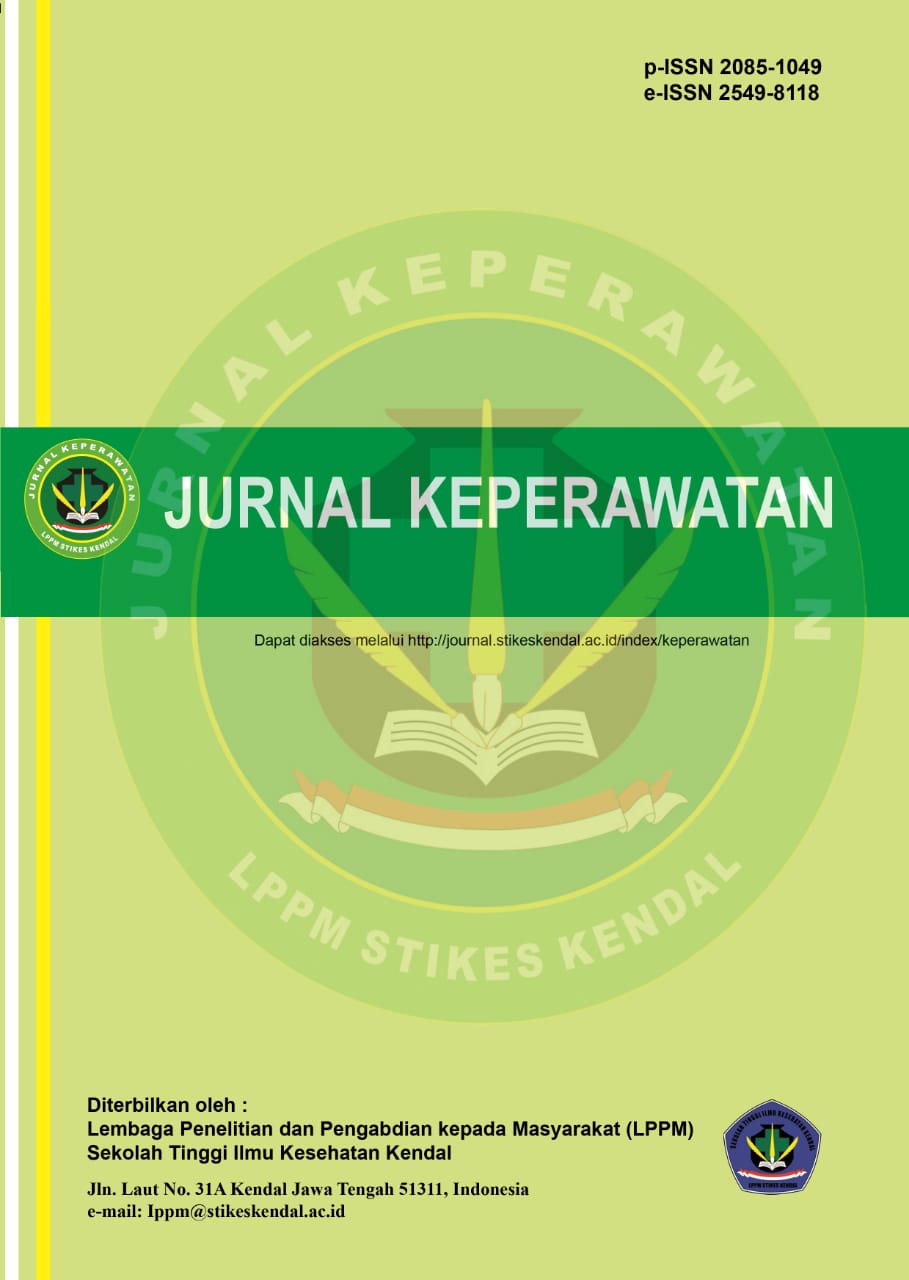A Literature Review of Loss and Grief Among Prisoners
DOI:
https://doi.org/10.32583/keperawatan.v15i3.877Keywords:
grief, loss, prisoners, prisonAbstract
Loss is a state of an individual experiencing the loss of something that previously existed and belonged. Grieving is a subjective condition that follows loss. Among inmates of all ages and genders, inmates' responses and cops to loss and grieving vary. The purpose of this literature review is to find out how the experience and response of loss and grieving inmates. Article searches are conducted using PubMed databases, Sage Journal and Google Scholar. The criteria for inclusion of articles used are full-text articles in English, types of qualitative and quantitative research, articles with a maximum of publication of the last 12 years (2010-2022) and articles focusing on the loss and grieving of prisoners. The search results obtained five articles that meet the inclusion criteria. The results obtained are differences in experience and response to loss and grieving in women, men, and the elderly. Women prisoners experience unresolved grief and a lack of integration and resolution, male inmates struggle to cognitively accept the reality of obituaries and tend to use maladaptive coping strategies in coping with grief within prisons, while elderly inmates persist by utilizing internal and external resources to help them to cope with loss.
References
Corcoran, M. (2018). Bereavement work in the criminal justice system. In Loss, Dying and Bereavement in the Criminal Justice System (pp. 86-95). Routledge.
Hamdan, S., Melhem, N. M., Porta, G., Song, M. S., & Brent, D. A. (2013). Alcohol and substance abuse in parentally bereaved youth. J Clin Psychiatry, 74(8), 828-833. https://doi.org/10.4088/JCP.13m08391
Harner, H. M., Hentz, P. M., & Evangelista, M. C. (2011). Grief interrupted: the experience of loss among incarcerated women. Qual Health Res, 21(4), 454-464. https://doi.org/10.1177/1049732310373257
Harris, D. L. (2019). Non-death loss and grief: Context and clinical implications. Routledge.
Lee, S. A. (2015). The Persistent Complex Bereavement Inventory: A Measure Based on the DSM-5. Death Stud, 39(7), 399-410. https://doi.org/10.1080/07481187.2015.1029144
Lewin, L. C., & Farkas, K. J. (2012). Living with the loss of a child: mothers in the criminal justice system. Palliat Support Care, 10(4), 265-272. https://doi.org/10.1017/s147895151100099x
Lillie, K., Corcoran, M., Hunt, K., Wrigley, A., & Read, S. (2018). Encountering offenders in community palliative care settings: challenges for care provision. International Journal of Palliative Nursing, 24(8), 368-375. https://doi.org/10.12968/ijpn.2018.24.8.368
Lundorff, M., Holmgren, H., Zachariae, R., Farver-Vestergaard, I., & O'Connor, M. (2017). Prevalence of prolonged grief disorder in adult bereavement: A systematic review and meta-analysis. J Affect Disord, 212, 138-149. https://doi.org/10.1016/j.jad.2017.01.030
Maschi, T., Viola, D., Morgen, K., & Koskinen, L. (2015). Trauma, stress, grief, loss, and separation among older adults in prison: the protective role of coping resources on physical and mental well-being. Journal of Crime and Justice, 38(1), 113-136. https://doi.org/10.1080/0735648X.2013.808853
Masterton, J. (2014). A confined encounter: the lived experience of bereavement in prison. Bereavement Care, 33(2), 56-62. https://doi.org/10.1080/02682621.2014.933572
Newsom, C., Stroebe, M. S., Schut, H., Wilson, S., Birrell, J., Moerbeek, M., & Eisma, M. C. (2019). Community-Based counseling reaches and helps bereaved people living in low-income households. Psychotherapy research, 29(4), 479-491.
Nielsen, M. K., Carlsen, A. H., Neergaard, M. A., Bidstrup, P. E., & Guldin, M. B. (2019). Looking beyond the mean in grief trajectories: A prospective, population-based cohort study. Soc Sci Med, 232, 460-469. https://doi.org/10.1016/j.socscimed.2018.10.007
Nielsen, M. K., Neergaard, M. A., Jensen, A. B., Vedsted, P., Bro, F., & Guldin, M. B. (2017). Predictors of Complicated Grief and Depression in Bereaved Caregivers: A Nationwide Prospective Cohort Study. J Pain Symptom Manage, 53(3), 540-550. https://doi.org/10.1016/j.jpainsymman.2016.09.013
Pilling, J., Thege, B. K., Demetrovics, Z., & Kopp, M. S. (2012). Alcohol use in the first three years of bereavement: a national representative survey. Subst Abuse Treat Prev Policy, 7, 3. https://doi.org/10.1186/1747-597x-7-3
Read, S., & Santatzoglou, S. (2018). Death, social losses and the continuum of disenfranchised grief for prisoners. In Loss, Dying and Bereavement in the Criminal Justice System (pp. 13-21). Routledge.
Read, S., Santatzoglou, S., & Wrigley, A. (2018). Loss, Dying, and Bereavement in the Criminal Justice System ((1st) ed.). Routledge. https://doi.org/https://doi.org/10.4324/9781315270166
Sitepu, C. B. (2021). Penanganan Masalah Rentan Narapidana Lanjut Usia dan Pembinaannya Di Lembaga Pemasyarakatan Narkotika Kelas IIA Karang Intan. Jurnal Syntax Transformation, 2(4), 470-477.
Soulsby, A. (2018). Working in the shadows: Reflections on counselling in prison and hospice settings. In Loss, Dying and Bereavement in the Criminal Justice System (pp. 107-116). Routledge.
Stroebe, M., Stroebe, W., Schut, H., & Boerner, K. (2017). Grief is not a disease but bereavement merits medical awareness. Lancet, 389(10067), 347-349. https://doi.org/10.1016/s0140-6736(17)30189-7
Stuart, G. W. (2016). Prinsip dan Praktik Keperawatan Kesehatan Jiwa Stuart 2.
Trust, P. R. (2018). In depth - mental health and social care. Retrieved 5 December from http://www.prisonreformtrust.org.uk/WhatWeDo/ProjectsResearch/Mentalhealth/TroubledInside/Indepthmentalhealthandsocialcare
Vaswani, N. (2014). The Ripples of Death: Exploring the Bereavement Experiences and Mental Health of Young Men in Custody. The Howard Journal of Criminal Justice, 53(4), 341-359. https://doi.org/https://doi.org/10.1111/hojo.12064
Vaswani, N. (2015). A catalogue of losses: Implications for the care and reintegration of young men in custody. Prison Service Journal, 220, 26-35.
Vaswani, N. (2018). Beyond loss of liberty: How loss, bereavement and grief can affect young men’s prison journeys. In Loss, Dying and Bereavement in the Criminal Justice System (pp. 177-187). Routledge.
Warrilow, A. (2018). The impact of loss on mental health: Implications for practice in criminal justice settings. In Loss, Dying and Bereavement in the Criminal Justice System (pp. 150-159). Routledge.
Wilson, M. (2011). Exploring the efficacy of a bereavement support group for male category C prisoners. Bereavement Care, 30(3), 10-16. https://doi.org/10.1080/02682621.2011.578001
Wilson, M., Johnston, H., & Walker, L. (2022). ‘It was like an animal in pain’: Institutional thoughtlessness and experiences of bereavement in prison. Criminology & Criminal Justice, 22(1), 150-170.
Downloads
Published
How to Cite
Issue
Section
License
Copyright (c) 2023 Jurnal Keperawatan

This work is licensed under a Creative Commons Attribution-NonCommercial-NoDerivatives 4.0 International License.




